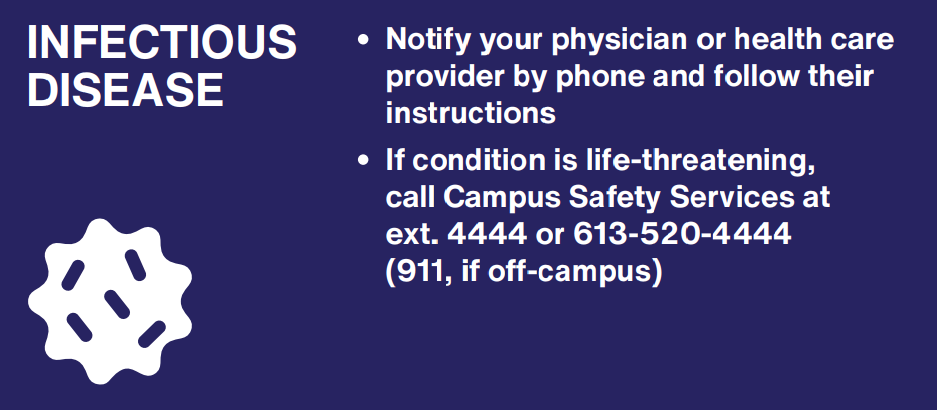Infectious Disease
Pathogenic microorganisms, such as parasites, viruses, bacteria, or fungi, cause infectious diseases. An infectious disease can be spread directly (person to person) or indirectly (from person to environment to another person).
IMMEDIATE ACTION

Notify your physician or health care provider by phone
Follow their instructions
If current condition is life-threatening, contact Campus Safety Services at 613-520-4444 or extension 4444 from a Carleton Landline if on-campus or, if off-campus, dial 911. Notify the dispatcher of the diagnosis and symptoms being experienced.
PREPARE NOW
KNOW THE RISKS. Stay informed on trends, reported cases, and investigations through Ottawa Public Health and the Public Health Agency of Canada.
PERSONAL HYGIENE. Ensure you wash your hands properly. Cover your mouth with your sleeve if you need to cough or sneeze. Do not share items with others, especially personal items. Practice handling food safely.
GET VACCINATED. Consult with your physician or health care provider to ensure you are up-to-date with all mandatory and recommended vaccinations.
TRAVEL SAFE. Ensure you take all precautions when travelling abroad. Speak with your doctor about your travel plans and inquire if any immunizations are required or recommended. Carleton University is also partnered with International SOS which provides travellers with pre-trip information / advisories, call-in assistance for routine advice (including medical and emotional support), and special advisories that may affect travel.
BE PREPARED TO SELF-SUSTAIN. If there is an outbreak, hospitals may ask or recommend that those that are infected remain at home to control the outbreak. It will be important that you have appropriate items and necessities on hand in case you need to stay home for a few days.
SURVIVE DURING
FOLLOW DIRECTIONS. If you believe you may be infected, contact your doctor or health care provider immediately before attending their clinic. They will advise you of appropriate procedures and protocols to follow. Follow the directions of health care providers and public health authorities.
DO NOT FREQUENT PUBLIC SPACES. If you are infected, do not frequent public spaces as this can cause further spread of the disease. If you are not infected but there is an outbreak in the area, it is best to limit outings in public spaces.
STAY INFORMED. Continue to monitor postings and notices from your local public health or national public health agencies.
BE SAFE AFTER
REMAIN PATIENT. A public health emergency like an infectious disease outbreak may take a while to be contained or deemed under control. Continue to monitor all updates from public health authorities and any directions from Carleton University officials.
SEEK HELP TO COPE WITH TRAUMA. Consider seeking professional help to cope with the long-term effects of trauma.